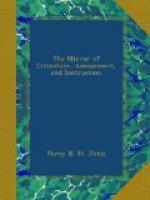“Oh, God! how little did I think of what our young folly entailed upon us! We delivered ourselves up to the dictates of our hearts, and forgot that there was a future. Neither of us had any ulterior design; we did not think—poor children that we were—of marriage, and settlements, and consent of relations. We touched each other’s hands, and were happy; we read poetry together—and when we lifted up our eyes from the page, those eyes met, and we did not know why our hearts beat so violently; and at length, when we spake of love, and when we called each other Lucy and ——; when we described all that we had thought in absence—and all we had felt when present—when we sat with our hands locked each in each—and at last, growing bolder, when in the still and quiet loneliness of a summer twilight we exchanged our first kiss, we did not dream that the world forbade what seemed to us so natural; nor—feeling in our own hearts the impossibility of change—did we ever ask whether this sweet and mystic state of existence was to last for ever!
“Lucy was an only child; her father was a man of wretched character. A profligate, a gambler—ruined alike in fortune, hope, and reputation, he was yet her only guardian and protector. The village in which we both resided was near London; there Mr. D—— had a small cottage, where he left his daughter and his slender establishment for days, and sometimes for weeks together, while he was engaged in equivocal speculations—giving no address, and engaged in no professional mode of life. Lucy’s mother had died long since, of a broken heart—(that fate, too, was afterwards her daughter’s)—so that this poor girl was literally without a monitor or a friend, save her own innocence—and, alas! innocence is but a poor substitute for experience. The lady with whom I had met her had known her mother, and she felt compassion for the child. She saw her constantly, and sometimes took her to her own house, whenever she was in the neighbourhood; but that was not often, and only for a few days at a time. Her excepted, Lucy had no female friend.
“One evening we were to meet at a sequestered and lonely part of the brook’s course, a spot which was our usual rendezvous. I waited considerably beyond the time appointed, and was just going sorrowfully away when she appeared. As she approached, I saw that she was in tears—and she could not for several moments speak for weeping. At length I learned that her father had just returned home, after a long absence—that he had announced his intention of immediately quitting their present home and going to a distant part of the country, or—perhaps even abroad.
* * * * *




